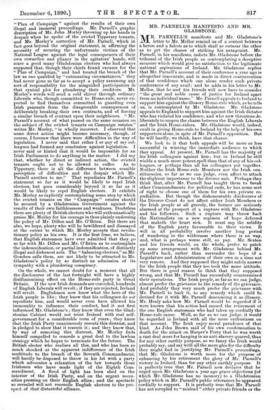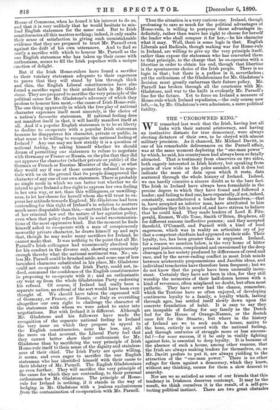MR. PARNELL'S MANIFESTO AND MR. GLADSTONE.
MR. PARNELL'S manifesto and Mr. Gladstone's letter to Mr. Mellor remind us of a contest between a heron and a falcon as to which shall so outsoar the other as to get the chance of striking his antagonist. Mr. Parnell, in his manifesto, indicts Mr. Gladstone before the tribunal of the Irish people as contemplating a deceptive measure which would give no satisfaction to the legitimate national aspirations of Ireland. Mr. Gladstone replies that Mr. Parnell's account of their conference a year ago is altogether inaccurate, and is made in direct contravention of that confidence which can alone render such private conferences of any avail ; and he adds in his letter to Mr. Mellor, that he and his friends will now have to consider "the great and noble cause of justice for Ireland apart from an individual name." Mr. Parnell appeals to Ireland to support him against the illusory Home-rule which, as he tells us, is contemplated by Mr. Gladstone. Mr. Gladstone appeals to England to support him against the Irish dictator who has violated his confidence, and who now threatens de- liberately to reopen the chasm between the English Liberals and the Irish Home-rulers. Mr. Gladstone would, indeed, exult in giving Home-rule to Ireland by the help of his own supporters alone, in spite of Mr. Parnell's opposition. But he will hardly, we think, have that chance.
We look to it that both appeals will be more or less successful in winning the immediate audience to which they appeal. At present, Mr. Parnell has the majority of his Irish colleagues against him ; but in Ireland he still wields a much more potent spell than that of any of his col- leagues, or perhaps than all his colleagues put together. Neither the Irish Home-rule Members nor the Irish con- stituencies, so far as we can judge, even affect to attach the slightest importance to the divorce suit. Perhaps they think that, after Mr. Parnell has taught them to break other Commandments for political ends, he has some sort of right to choose one of them for his own private re- pudiation. But though the dishonourable disclosures of the Divorce Court do not affect either Irish Members or the Irish people at all gravely, the former are seriously alarmed at the prospect of a rupture with Mr. Gladstone and his followers. Such a rupture may throw back the Nationalists on a new regimen of hope deferred that maketh the heart sick. It must sap the solidity of the English party favourable to their views. It will in all probability involve another long period of wandering in the wilderness where there is no way, and, what is perhaps worse still, no pay. Mr. Sexton and his friends would, on the whole, prefer to patch up some arrangement with Mr. Gladstone behind Mr. Parnell's back, rather than surrender the hope Of a Legislature and Administration of their own in a time not very remote. And they supposed they might safely answer for the Irish people that they too took the same attitude. But there is good reason to think that they supposed wrong, and that Mr. Parnell has sucessfully countermined their operations. The Irish people, so far as we can judge, almost prefer the grievance to the remedy of the grievance. And probably they very much prefer the grievance with Mr. Parnell to back it, to any remedy which could be devised for it with Mr. Parnell denouncing it as illusory. Mr. Healy asks how Mr. Parnell would be regarded if it were known that his action had caused the retirement of the one English statesman who had taken up cordially the Home-rule cause. Well, so far as we can judge, it would be regarded in Ireland with all the more enthusiasm on that account. The Irish enjoy moral paradoxes of that kind. As John Brown said of his own condemnation to death for the attack on Harper's Ferry that he was worth a vast deal more for hanging in an anti-slavery quarrel, than for any other earthly purpose, so we fancy the Irish would probably say, and say with all the more glee for the difficulty they might find in justifying Mr. Parnell's proceedings, that Mr. Gladstone is worth more for the purpose of enhancing by his retirement the glory of Mr. Parnell's victory in Ireland, than for any other earthly purpose. It is perfectly true that Mr. Parnell now declares that he urged upon Mr. Gladstone a year ago grave objections (of which Mr. Gladstone has no memory) to a Gladstonian policy which in Mr. Parnell's public utterances he appeared cordially to support. It is perfectly true that Mr. Parnell has not scrupled to "mislead" either private friends or the House of Commons, when he found it his interest to do so, and that it is very unlikely that he would hesitate to mis- lead English statesmen for the same end. But to Irish constituencies all this matters nothing; indeed, it only exalts their sense of satisfaction in giving such unmistakeable evidence that they are prepared to trust Mr. Parnell even against the drift of his own utterances. And to find so costly a sacrifice with which to honour Mr. Parnell as the one English statesman who has taken up their cause with enthusiasm, seems to fill the Irish populace with a unique emotion of delight.
But if the Irish Home-rulers have found a sacrifice to their tutelary statesman adequate to their eagerness to prove that they will stand by him through thick and thin, the English Liberal constituencies have also found a sacrifice equal to their ardent faith in Mr. Glad- stene. They are prepared to sacrifice the very principle of the political cause for Mr. Gladstone's advocacy of which they profess to honour him most,—the cause of Irish Home-rule. The one thing apparently in which the free play of national character expresses itself most sincerely, is the choice of a. nation's favourite statesman. If national feeling does nut manifest itself in that, it will hardly manifest itself at all. And if a popular English statesman is to be at liberty to decline to co-operate with a popular Irish statesman because he disapproves his character, private or public, in what sense is he willing to recognise the national feeling of Ireland ? Any one may see how strictly it is a question of national feeling, by asking himself whether we should dream of permitting our statesmen to refuse to negotiate with Germany or France or Russia, on the plea that they did not approve the character (whether private or public) of the German or French or Russian Minister of the day ; or what they would say if one of those countries refused to nego- tiate with us on the ground that its people disapproved the character of any one of our own statesmen. There is probably no single mode in which we can better test whether we do intend to give Ireland a free right to express her own feeling in her own way, or not, than this willingness, or unwilling- ness, to let her choose for herself whom she will trust to ex- press her attitude towards England. Mr. Gladstone had been contending for this right of Ireland's in relation to matters much more disputable than this,—matters like the character of her criminal law and the nature of her agrarian policy, even when that policy reflects itself in social excommunica- tions of the most oppressive kind. But the moment he finds himself asked to co-operate with a man of conspicuously unworthy private character, he draws himself up and says that, though he may make many sacrifices for Ireland, he cannot make that. It was nothing to the point that all Mr. Parnell's Irish colleagues had unanimously absolved him for his conduct in the divorce suit, showing conspicuously enough thereby what the national sentiment was. No ; un- less Mr. Parnell could be brushed aside, and some one of less tarnished character substituted in his place, Mr. Gladstone could. not co-operate with the Irish Party, could not, in- deed, command the confidence of the English constituencies in proposing to co-operate with it ; and an enthusiastic cry went up from the whole Gladstonian Party endorsing his refusal. Of course, if Ireland had really been a separate nation, no refusal of the sort would have been even thought of. We should have taken the expressed will of Germany, or France, or Russia, or Italy as overriding altogether our own right to challenge the character of the statesman with whom we were asked to enter into negotiations. But with Ireland it is different. Although Mr. Gladstone and his followers have made the recognition of the separate national feeling in Ireland the very issue on which they propose to appeal to the English constituencies, none the less, nay, all the more on that account, the Liberal Party feel that they cannot better show their enthusiasm for Mr. Gladstone than by sacrificing the very principle of Irish Home-rule itself to their sense of the dignity and stainless- ness of their chief. The Irish Party are quite willing, it seems, and even eager to sacrifice the one English statesman who has identified himself with their cause to their idolatry of Mr. Parnell. The English Gladstonians go even further_ They will sacrifice the very principle of the cause for which they are contending, to their personal enthusiasm for Mr. Gladstone. The principle of Home- rule for Ireland is nothing, if it stands in the way of hedging. in Mr. Gladstone with a jealous exclusiveness from the contamination of co-operation with Mr. Parnell. Thus the situation is a very curious one. Ireland, though professing to care so much for the political advantages of Home-rule, is willing to postpone these advantages in- definitely, rather than waive her right to choose for herself the leader who shall conquer it for her,—be his character what it may. Well, there is some logic in that. English Liberals and Radicals, though making war for Home-rule in Ireland, are willing to give up the very principle itself, rather than expose the statesman who has converted them to that principle, to the charge that he co-operates with a libertine in order to obtain his end, though that libertine is the spontaneous choice of the Irish people. There is no logic in that; but there is a pathos in it, nevertheless ; yet the enthusiasm of the Gladstonians for Mr. Gladstone's decision must greatly embarrass their future policy. Mr. Parnell has broken through all the courtesies with Mr. Gladstone, and war to the knife is evidently Mr. Parnell's line for the future. Yet to force on Ireland a measure of Home-rule which Ireland repudiates,—the only course now left,—is, by Mr. Gladstone's own admission, a mere political futility.























































 Previous page
Previous page